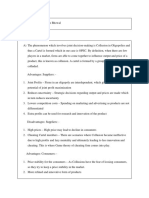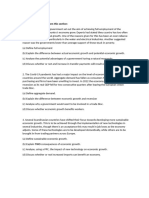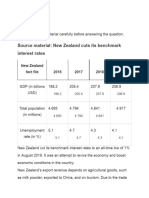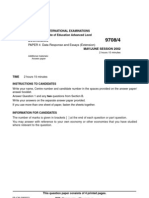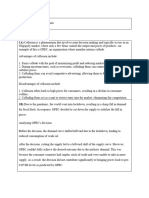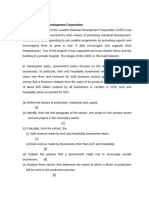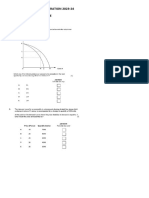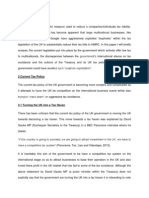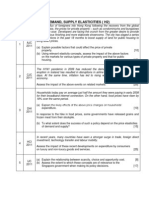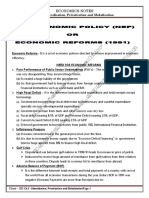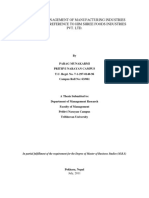G9 Sa1 WS4 QP
G9 Sa1 WS4 QP
Uploaded by
jyotsnatrathodCopyright:
Available Formats
G9 Sa1 WS4 QP
G9 Sa1 WS4 QP
Uploaded by
jyotsnatrathodOriginal Title
Copyright
Available Formats
Share this document
Did you find this document useful?
Is this content inappropriate?
Copyright:
Available Formats
G9 Sa1 WS4 QP
G9 Sa1 WS4 QP
Uploaded by
jyotsnatrathodCopyright:
Available Formats
Worksheet
1. Tax revenue from both direct and indirect taxes in Germany rose to US$860 billion in
2013. The increase was largely due to a fall in unemployment. Germany has a
progressive tax system. In 2014, German politicians discussed whether the tax rates
should be increased. Changes in tax rates influence the amount of tax revenue received
and the nature of the tax system.
a. Define ‘a progressive tax’. [2]
b. Explain the difference between direct and indirect taxes. [4]
c. Discuss whether a government should increase tax rates. [8]
2. The price of shares in a large UK supermarket firm fell on the London Stock Exchange in
2014 when it was announced that it was expecting a reduction in its profits. The increased
competition from German supermarket firms had forced the UK supermarket to consider
a number of ways of cutting its costs by, for example, reducing some of its workers’ wage
rates and increasing some workers’ working hours.
a. Explain why some firms may have survival as a short-term goal. [4]
b. Analyse how consumers may suffer as a result of a fall in the profits firms earn.
[6]
3. A falling death rate is affecting the size of China’s population, which in turn is
influencing demand for a range of products including table salt. The Chinese Government
has recently considered ending the state salt monopoly. An online survey, however,
revealed that most Chinese people oppose introducing more competition into the market,
thinking it will cause the price of salt to rise.
a. Define a ‘monopoly’. [2]
b. Analyse why price can be lower in a monopoly market than in perfect
competition. [6]
4. Between 2008 and 2014, Greece’s Gross Domestic Product fell by 25%. Thousands of
sole proprietors and other business organisations went out of business. As a result, the
unemployment rate increased to 28%. The Government reduced its spending and was
being encouraged by the International Monetary Fund to cut its corporation tax (the tax
on firms’ profits).
a. Explain two advantages of a sole proprietor. [4]
b. Discuss whether a cut in corporation tax will increase economic growth. [8]
You might also like
- Covid 19 - Case StudyDocument8 pagesCovid 19 - Case Studytrinanjan bhowal100% (6)
- Haugom Erik Essentials of Pricing Analytics Tools and ImplemDocument291 pagesHaugom Erik Essentials of Pricing Analytics Tools and ImplemHubert PawlikowskiNo ratings yet
- Case Study - Lamoiyan CorporationDocument25 pagesCase Study - Lamoiyan CorporationAnalyn Tilacas CortezNo ratings yet
- FormulationDocument40 pagesFormulationNitin KumarNo ratings yet
- CASE STUDY Vershire CompanyDocument7 pagesCASE STUDY Vershire CompanyAradhysta Svarnabhumi0% (1)
- IGCSE - Mock 2 Econ Paper 2 QPDocument4 pagesIGCSE - Mock 2 Econ Paper 2 QPTOMY PERIKOROTTE CHACKONo ratings yet
- IGCSE - Mock 2 Econ Paper 2 MSDocument11 pagesIGCSE - Mock 2 Econ Paper 2 MSTOMY PERIKOROTTE CHACKONo ratings yet
- Structured Questions Economic Growth (Chapters 24,25,29) 1Document1 pageStructured Questions Economic Growth (Chapters 24,25,29) 1eddie zhangNo ratings yet
- Cambridge International General Certificate of Secondary EducationDocument8 pagesCambridge International General Certificate of Secondary EducationJameson ZhouNo ratings yet
- Economics Unit 4 Test SQDocument8 pagesEconomics Unit 4 Test SQssekaren.thioNo ratings yet
- Theory For EconomicsDocument14 pagesTheory For Economicsyashvvi bagrodiaNo ratings yet
- azan rabbani - XIC BLUE ECONOMICS MONTHLY ASSESSMENT (SECTION 6)Document2 pagesazan rabbani - XIC BLUE ECONOMICS MONTHLY ASSESSMENT (SECTION 6)azan.9637No ratings yet
- 9708 Y16 SP 4Document4 pages9708 Y16 SP 4jihyunbae925No ratings yet
- Business Studies WorkSheetDocument1 pageBusiness Studies WorkSheetMano_Bili89100% (1)
- 2014 A Level Econs Essay QuestionsDocument2 pages2014 A Level Econs Essay QuestionsJaiSachiNo ratings yet
- Economics: PAPER 4 Data Response and Essays (Extension)Document4 pagesEconomics: PAPER 4 Data Response and Essays (Extension)roukaiya_peerkhanNo ratings yet
- Ied 3 Extra NotesDocument25 pagesIed 3 Extra NotesAdil MasudNo ratings yet
- 2024 SH2 H2 Econ Revision 2 (Suggested Answer)Document15 pages2024 SH2 H2 Econ Revision 2 (Suggested Answer)evermorenicole42No ratings yet
- Economics 1B Final OSA-1Document8 pagesEconomics 1B Final OSA-1zikhalia851No ratings yet
- AF Mock - O Level P2Document5 pagesAF Mock - O Level P2Asif FarooqNo ratings yet
- KhushiJain_Covid19Document5 pagesKhushiJain_Covid19shivangi jainNo ratings yet
- One or Two of Your Chosen Questions Must Be From This SectionDocument2 pagesOne or Two of Your Chosen Questions Must Be From This SectionMelissaNo ratings yet
- 2008 AJC H2 Economics Prelim ExamDocument2 pages2008 AJC H2 Economics Prelim ExamSean HoNo ratings yet
- Econs Practice PaperDocument3 pagesEcons Practice PaperJasmine N.No ratings yet
- EconDocument7 pagesEconsofiabahrami20No ratings yet
- Cambridge International Advanced Subsidiary and Advanced LevelDocument4 pagesCambridge International Advanced Subsidiary and Advanced LevelDanny DrinkwaterNo ratings yet
- H2 EconomicsDocument6 pagesH2 EconomicsDeclan Raj0% (1)
- Cambridge International Advanced Subsidiary and Advanced LevelDocument4 pagesCambridge International Advanced Subsidiary and Advanced Levelsutirman.chaiNo ratings yet
- IGCSE Economics 0455 Structured Sample PaperDocument5 pagesIGCSE Economics 0455 Structured Sample Paperaditi.mishraNo ratings yet
- TPJC 2007 Prelim H2 P2 QN PaperDocument3 pagesTPJC 2007 Prelim H2 P2 QN PaperFang Wen LimNo ratings yet
- GCSE - AQA - Paper1 - Oct 3Document18 pagesGCSE - AQA - Paper1 - Oct 3dianaglectaNo ratings yet
- LokiDocument7 pagesLokidortey.tetteh27No ratings yet
- UNIT 3 AND 4Document11 pagesUNIT 3 AND 4tanbha12No ratings yet
- Wa0047.Document4 pagesWa0047.mbovingjeftheNo ratings yet
- Economics: PAPER 4 Data Response and Essays (Extension)Document4 pagesEconomics: PAPER 4 Data Response and Essays (Extension)LaLaaLynnNo ratings yet
- Economics Paper 4 Da: Mock 2 Exam A'LevelDocument4 pagesEconomics Paper 4 Da: Mock 2 Exam A'LevelMichael RajaNo ratings yet
- 新高二经济学科暑期作业Document12 pages新高二经济学科暑期作业juliah20080202No ratings yet
- Facts and Figures On UK's Fiscal Deficit (2000-2010) .Document10 pagesFacts and Figures On UK's Fiscal Deficit (2000-2010) .Aditya NayakNo ratings yet
- 3.5.3.2 Worksheet AnswersDocument5 pages3.5.3.2 Worksheet AnswersubrunelliNo ratings yet
- 2281 w11 QP 22Document4 pages2281 w11 QP 22mstudy123456No ratings yet
- Tax Avoidance CoursworkDocument6 pagesTax Avoidance CoursworkDavid ThomsonNo ratings yet
- ECONOMICS 2014 Past PapersDocument7 pagesECONOMICS 2014 Past PapersHenry OkoyeNo ratings yet
- 0455 w17 QP 22Document8 pages0455 w17 QP 22Fahad AliNo ratings yet
- Review Lecture Notes Chapter 33Document8 pagesReview Lecture Notes Chapter 33- OriNo ratings yet
- Q1 PracticeDocument2 pagesQ1 Practice269297No ratings yet
- 0455 m16 QP 22Document4 pages0455 m16 QP 22VRP ProductionsNo ratings yet
- IMT Covid19Document5 pagesIMT Covid19Proshanjit DeyNo ratings yet
- IMT Covid19Document5 pagesIMT Covid19Proshanjit DeyNo ratings yet
- Case Study # 1Document1 pageCase Study # 1Shan Zhymuel LaysonNo ratings yet
- All JCs H2 Econs Prelim 2011Document19 pagesAll JCs H2 Econs Prelim 2011Clarion TanNo ratings yet
- End of Unit 6 QuestionsDocument4 pagesEnd of Unit 6 Questionscuentas valeriaNo ratings yet
- Chapter-3 IEDDocument14 pagesChapter-3 IEDKrrish WaliaNo ratings yet
- Mixed Economy QestionsDocument3 pagesMixed Economy QestionsAbdusalom MuhammadjonovNo ratings yet
- Module 2-Practice QuestionsDocument4 pagesModule 2-Practice Questionslisa xuNo ratings yet
- Concept and Meaning of LPGDocument9 pagesConcept and Meaning of LPGovhal2003No ratings yet
- Aggregate Demand Unpacking The Multiplier and Accelerator Effects - 1Document2 pagesAggregate Demand Unpacking The Multiplier and Accelerator Effects - 1Saaiessan RavindranNo ratings yet
- Types of Business OrganisationsDocument2 pagesTypes of Business Organisationsabdulla.rasheedNo ratings yet
- MJC H2 Econs CSQ2 Q ADocument7 pagesMJC H2 Econs CSQ2 Q AKaren TanNo ratings yet
- Igcse EconomicsDocument3 pagesIgcse Economicssamgosh100% (1)
- Covid19 AssignmentDocument5 pagesCovid19 AssignmentAnonymous 1997No ratings yet
- Global Tax Revolution: The Rise of Tax Competition and the Battle to Defend ItFrom EverandGlobal Tax Revolution: The Rise of Tax Competition and the Battle to Defend ItNo ratings yet
- How to Write Bids That Win Business: A guide to improving your bidding success rate and winning more tendersFrom EverandHow to Write Bids That Win Business: A guide to improving your bidding success rate and winning more tendersNo ratings yet
- Cangque A Bapf 106 Ba Module 1 For CheckingDocument27 pagesCangque A Bapf 106 Ba Module 1 For CheckingArmalyn Cangque100% (1)
- Business ModelsDocument21 pagesBusiness ModelsDeborah Nisha Miranda100% (1)
- Marketing Mix ExplanantionDocument73 pagesMarketing Mix ExplanantionanishjohnaNo ratings yet
- Strategic Management - Business Level StrategiesDocument25 pagesStrategic Management - Business Level StrategiesRohit GuptaNo ratings yet
- ABM Applied Economics Module 4 Determining The Implications of Market Pricing On Economic Decision Making 2Document24 pagesABM Applied Economics Module 4 Determining The Implications of Market Pricing On Economic Decision Making 2Althea100% (1)
- Dissertation Financial Performance AnalysisDocument8 pagesDissertation Financial Performance AnalysisBuyACollegePaperMobile100% (1)
- Corporate Financialization and Worker Prosperity: A Broken LinkDocument22 pagesCorporate Financialization and Worker Prosperity: A Broken LinkRoosevelt Institute100% (4)
- The Relationship Between Working Capital Management and Profitability: A Case Study of Cement Industry in PakistanDocument8 pagesThe Relationship Between Working Capital Management and Profitability: A Case Study of Cement Industry in PakistanAtif SiddiqueNo ratings yet
- Inventory Management of Manufacturing Industries in NepalDocument96 pagesInventory Management of Manufacturing Industries in NepalKharel KamalNo ratings yet
- Practice Test For The Final ExamDocument10 pagesPractice Test For The Final ExamMeghna N MenonNo ratings yet
- Rafhan Corn Oil - Marketing MixDocument13 pagesRafhan Corn Oil - Marketing MixmehboobmeghaniNo ratings yet
- Top 7 Ways To Overpay VendorsDocument10 pagesTop 7 Ways To Overpay VendorsBerlin PacificNo ratings yet
- Poornima University Bba SyllabusDocument52 pagesPoornima University Bba SyllabusayushiboyalNo ratings yet
- Strategy Session 3Document3 pagesStrategy Session 3Maria Alejandra RamirezNo ratings yet
- Accounts-Annual Report-Group 7 20231030 102533 0000Document63 pagesAccounts-Annual Report-Group 7 20231030 102533 0000Akshar VekariyaNo ratings yet
- Competition and Co-Operation in Business Ecosystem: Food Tech Hunger GamesDocument20 pagesCompetition and Co-Operation in Business Ecosystem: Food Tech Hunger GamesRakesh SethyNo ratings yet
- Theory of FirmsDocument17 pagesTheory of FirmsWasif AzizNo ratings yet
- Mack TilesDocument26 pagesMack TilesNuwani ManasingheNo ratings yet
- Brodcasting RightsDocument37 pagesBrodcasting RightsAwseome Vaibhav SahrawatNo ratings yet
- Open BookDocument8 pagesOpen Bookvijeta diwanNo ratings yet
- ECO402 NotesDocument13 pagesECO402 NotesImranNo ratings yet
- Chapter 1. Introduction To International BusinessDocument30 pagesChapter 1. Introduction To International BusinessReshma RaoNo ratings yet
- Principle of Marketing AwashDocument133 pagesPrinciple of Marketing AwashamanNo ratings yet
- (Slides) Chapter 2. Applications of Single Variable Function in Economics and BusinessDocument59 pages(Slides) Chapter 2. Applications of Single Variable Function in Economics and BusinessGiang ThùyNo ratings yet
- CH 4Document20 pagesCH 4Elayaraja ThirumeniNo ratings yet
- Oligopoly Market.2022Document4 pagesOligopoly Market.2022Mouna RachidNo ratings yet
